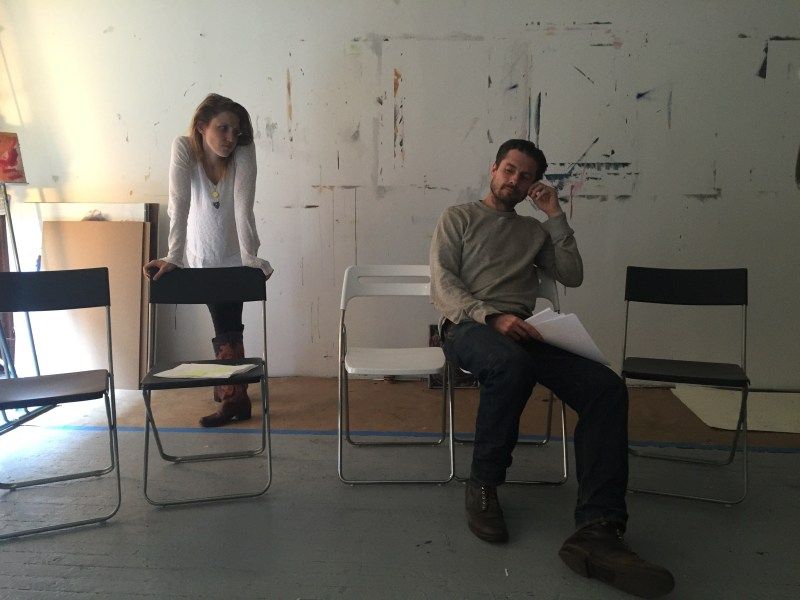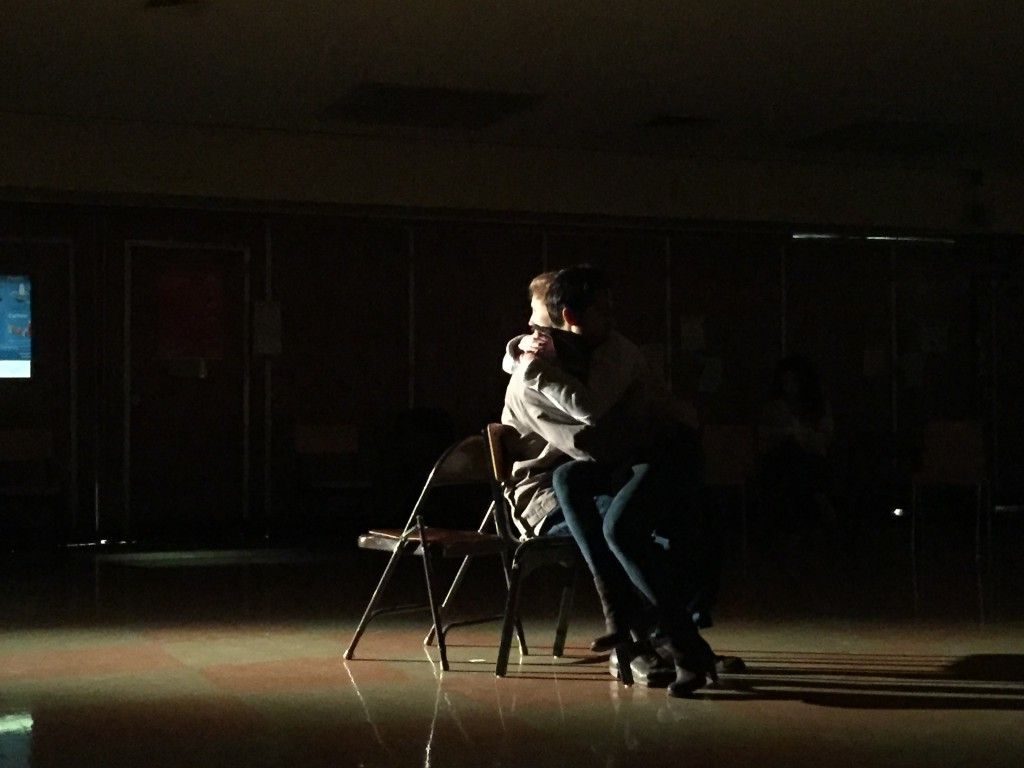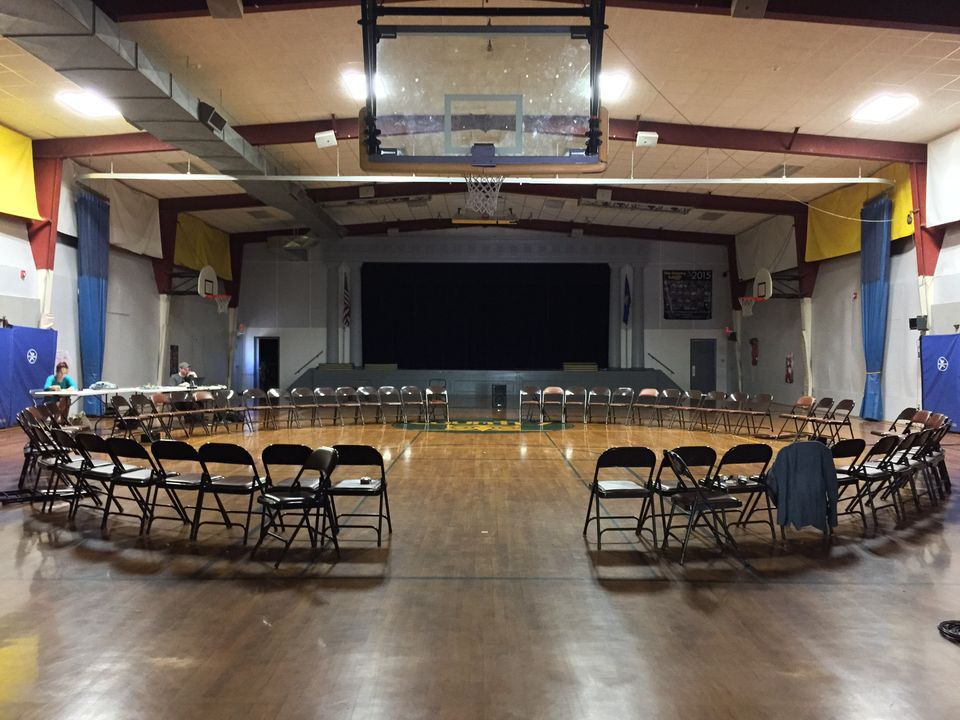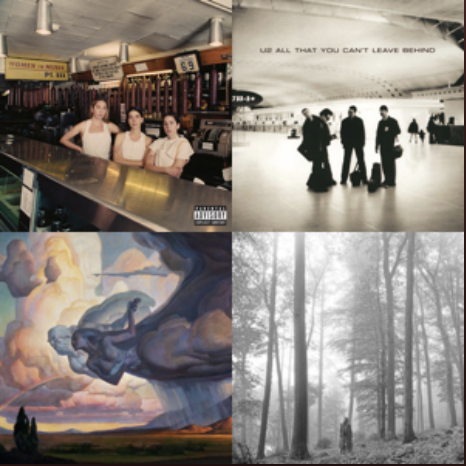Rehearsal. Tuesday, 3:30 PM.
“I have these visions, of choking, drowning, a disease, being kidnapped, being murdered, mutilation...”
There was a long pause.
“I don’t know why I’m saying this.”
Allison stops short. The white-walled studio is lit by scoop lights that point up toward the ceiling. As if on queue, the jackhammer outside starts up again to fill the silence. The director, Mikhael, pulls the lead glass windows closed and turns her attention back to Allison, an actor, and the moment at hand.
We are rehearsing a play that I wrote. Mikhael stands next to Allison, scripts in their hands, and together they are analyzing every word, every bit of punctuation, to uncover the hidden spirit locked in the black ink.
“I understand the way… it’s overwhelming, I get that. But why am I saying it now? What is it to him?”
My heart beats more quickly. I understand her question. I wrote the scene. I wrote the whole play, and yet I don’t have an answer. I know I had to write it that way, but to articulate how it should be interpreted and performed is completely beyond me. What if it doesn’t belong here? What if it it’s getting in the way?
Mikhael, the soul of patience, steps in.
“He gave you something right before this, right? His confession? Maybe this is something you’re giving back to him?”
Allison’s eyes close. Her head tilts slightly and her lips flutter like laughing. Her forehead wrinkles in a lightning-quick frown.
“Let me try something.”
There is a thrill to making theatre because it is a communal art. No play is complete until the script is written, the director has staged it, the designers have lit the set they built, and the actors have spoken the words in front of an audience. All told, it will require thousands of hours of work from dozens of people to bring this scene to life. And at the end we will have some pictures, some reviews, and some awards, if we’re lucky. But nothing tangible will remain.
We are making something that lasts only in the memories of our audience. Our medium is our own bodies and spirits, our tools are our own thoughts and emotions and wills, and the product will be an experience that will be over within 95 minutes. And then it is left to the memories of strangers.
“Moments made us. We are made of moments, not molecules.”
You start with a dream, and it ends in a memory. A fitting circle.

This play is about the aftermath of a son’s tragic death. His mother and father are part of a support group for grieving parents, and we watch as they grapple with their memories and emotions. Told in a fragmented, poetic style, we don’t know who these people are at the top of the show, and as their story unfolds we discover what really happened that day.
Our production presents the support group in a tangible form as a circle of chairs. Each show is limited to 52 audience members who sit in the chairs, becoming the other members of the group. We have adopted a public school cafeteria on New York City’s Lower East Side, decamping our light trees and speakers after school hours, and when the audience enters they become part of the world of the play.
In immersive work like this, the techniques for staging the show become vital. How do we create the experience of being in the support group without eliciting responses from the audience? What if somebody starts talking? What if somebody leaves? We want to create an engaging experience, presenting the characters in their raw form, but not an interactive one. And we want the audience to feel safe, but also unavoidably close to the action.
There is no way to anticipate all the possible outcomes, and so the actors must respond in the moment to whatever impulses they encounter. One night a janitor spent an eternity jangling his keys as he tried to unlock a classroom door. Another night we spilled a cup of water. Live theatre teaches actors to concentrate on the reality of the characters and their imaginary circumstance, but immersive work demands that they also keep an eye and ear open to the real world.
…
This play is about parenting, and partnering. As a new parent myself, I was struck by how I related to other parents and news stories about tragedies like Sandy Hook, and other events closer to home. I shared the burden they felt. I shared the fear, the anger, the loss. And healing became a function of community.

Plays, too, are raised from newborns to adulthood over the course of a few weeks. There is a balance of giving rules and providing freedom. But theatre is the art of incarnation. What starts out as an idea must find its physical form in the body and voice of an actor.
If I’m the playwright, does that make me the father? Or the mother? And the director is the midwife? This metaphor is weird.
Tech. Thursday, 10:45 PM.
Theatre has a particular form of torture known as “tech.” During this phase, the technical elements of a production – the lights, sound, costumes, and props – are integrated with the lines and movements of the actors for the first time. The stage manager and run crew work with the designers to make sure that the artful ideas behind each element are working effectively in the world of the story. At its best, it creates a new language:
“Can the lights be louder here?”
“We need a blouse that says ‘yoga mom’ but also ‘I have a professional career’”
“That coffee cup is way too emotional. Let’s try something else.”
And it takes practice to coordinate the lights and sound with the movement. The actors feed off the energy of the space and, in a sense, they can embody the technical elements too.
“Hold, please.”
“From the top of page 38.”
These are long nights. Tedious, careful nights. And we take care of each other best we can.
Writing for the theatre is to begin a journey that can only be completed by others. I am grateful for the team’s hard work, but still my heart asks, are we ready? How will the audience react? Will they get it? Are we fooling ourselves to think people will want to see this show?
I know we are well-prepared, but there is no way to control what will happen in the moment. And we have the armor of our art: the lights, sound, costumes, and props, as well as weeks of ingraining the lines and movements into our bodies. But each night is a risk. Telling this story, never gets easier.
Saturday Night. First preview. 6:15 PM.
We drove up to Connecticut for an out-of-town preview to be presented in a school gymnasium. The cavernous space could eat our tiny rehearsal studio. And the chairs! A circle large enough to accommodate 50 audience members becomes an infinite distance for an actor to cross.
“I know I need to be in the six o’clock chair.” Michael, an actor, is mapping out his next move before the show begins. “That’s gonna take me forever.”
“Think about the breath.” Mikhael the director offers. “Inhale with the beat change, and the exhale drives you up and out of your seat.”
Michael’s face is grim. He nods, sets his jaw. He is a tireless worker. He breathes, and rises with a jolt. As the words tumble out of him I am leaning forward in my seat, hungrily listening to everything. I know these words! But here he is telling me about his life, his son, with my lines. I am transported.
…
Being on stage is its own form of nakedness. And being exposed to an audience surrounding you on all sides is especially intimidating. How comfortable are we in our bodies? We all have parts we would rather hide. The actors amaze me with their bravery. They stand in front of us and let their emotions out – raw, ugly, fiercely uncontrollable things – in the service of the story. Faces contort, hands writhe. Even your own breathing betrays you, and panic sets in. Is that the character? Is that me?
“Line.”
Michael’s face flickers with annoyance. He asks for help.
“Hi. My name is Brian...” Kristy the stage manager prompts him in a clinical monotone.
“Hi. My name is Brian. My wife told me to come here.”
He catches the rhythm again and he is off. The move to the far chair is a tightrope towards an uncertain goal. He lands in his new seat and looks around. I watch as he calculates the trajectory of his next cross, but this time I see the character Brian, too. Michael wants out of that seat. Brian wants out of that room. Brian doesn’t want to share tonight. Michael stands to go. In a shift, he delivers the next line straight to Allison, to her eyes, and waves of emotion radiate out from them, filling that basketball court, blazing up to the dark Connecticut sky.
…
Dean’s new play TOGETHER WE ARE MAKING A POEM IN HONOR OF LIFE runs through June 28, in an immersive workshop production at The Cafeteria of P.S. 142 / Amalia Castro Public School, on New York City’s Lower East Side. More info: http://www.inhonoroflifetheplay.com




